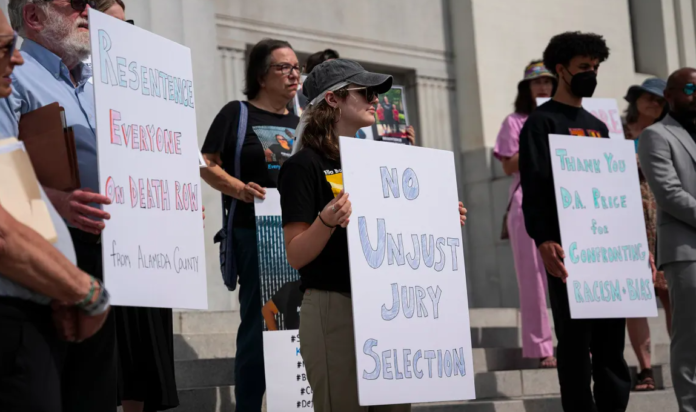
By
One by one, a California prosecutor eliminated five out of six Black women from the jury pool for a death penalty case in which a white carpet cleaner slayed his client, a young mother.
The attorney in Alameda County had a reason for each dismissal. He believed one, for instance, appeared too reluctant to impose a death sentence. Another had a “liberal bent.” After the defense struck the last Black woman, the jury proceeded with no Black members even though Black people made up close to 15% of Alameda County’s population at the time.
That jury in February 2000 found Giles Albert Nadey guilty of murdering and sodomizing 24-year-old Terena Fermenick, and it sent him to death row.
Twenty-four years later, the Alameda District Attorney’s office is in the hot seat for allegedly striking Black and Jewish people from juries around the time of Nadey’s sentencing. A federal judge two months ago ordered it to review all of its death penalty cases to look for signs of racial bias.
In Nadey’s case, however, the California Supreme Court this week found that the prosecutor had valid reasons to dismiss the Black jurors. It upheld his sentence despite Nadey’s appeal contending his case was tainted by racial bias.
“We conclude in each instance the prosecutor’s reasons were inherently plausible and
supported,” the court ruled, citing evidence from jury questionnaires and the prosecutor’s questioning of the stricken jurors.
Their 5-2 decision highlights the complexities of recent moves in court and in the Legislature to address racial bias in capital cases. Gov. Gavin Newsom in 2019 declared a moratorium on executions, writing in his executive order that “death sentences are unevenly and unfairly applied to people of color, people with mental disabilities, and people who cannot afford costly legal representation.”
In Alameda County, an appeal over the 1993 death penalty conviction of Ernest Edward Dykes recently uncovered evidence suggesting prosecutors for years excluded potential Black and Jewish jurors based on their identity. That was the root of U.S. District Judge Vince Chhabria’s April order directing Alameda County District Attorney Pamela Price to review the office’s past capital convictions.

